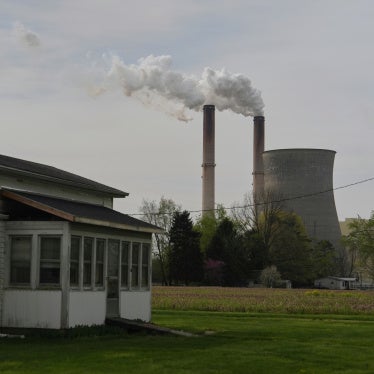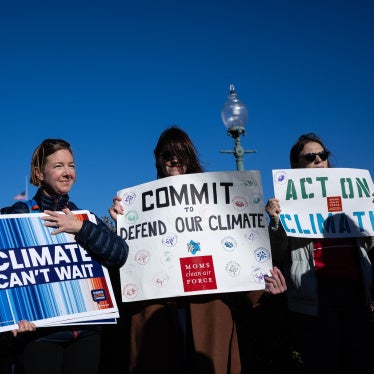December 10, 2019
The Honorable Andrew M. Cuomo
Governor of New York State
NYS State Capitol Building
Albany, NY 12224
Re: Senate bill S5343
Dear Governor Cuomo,
I write to you as the executive director of Human Rights Watch and a longstanding resident of New York state to urge you to sign Senate bill S5343, legislation that would ban the toxic pesticide chlorpyrifos statewide. The bill is essential to protect New York’s children, farmworkers, and environment.
Human Rights Watch is a global human rights organization. Among our specialized teams are ones dedicated both to children’s rights and to the environment and human rights. We have documented exposure of children and workers to toxic substances in a range of countries, including Bangladesh, Brazil, China, Indonesia, Kenya, Zimbabwe, and the United States.
In addition, we have reported on working conditions for farmworker women and children in various parts of the United States.[i] Under both federal and New York State labor laws, children as young as 12 can legally work as hired farmworkers.[ii] Our research has shown that child farmworkers are often exposed to toxic pesticides while they work.
Our 2014 report on hazardous child labor in US tobacco farming found more than half of the child farmworkers interviewed had been exposed to unknown pesticides while they worked. Many reported having suffered acute health effects immediately afterward including nausea, vomiting, dizziness, headaches, shortness of breath, burning of the eyes and nose, skin irritation, and redness and swelling of the mouth.[iii]
Pesticide exposure is harmful for farmworkers of all ages, but children are uniquely vulnerable to the adverse effects of toxic exposures because their bodies are still developing, and they consume more water and food, and breathe more air, pound for pound, than adults.[iv]
Research has shown chlorpyrifos to be a particularly harmful to human health, especially when pregnant women or young children are exposed. Prenatal exposure has been linked to autism spectrum disorder, reduced IQ, and a range of disabilities in learning, memory, and attention in children.[v]
International human rights treaties affirm that all people have a right to the best possible standard of health. They also impose on governments the responsibility for safeguarding health, especially for children, and ensuring that workers are protected from exposure to harmful chemicals. That’s why banning chlorpyrifos is a human rights imperative.
Human Rights Watch has repeatedly called on governments to ban chlorpyrifos, given the strong evidence of its dangers to public health and the environment. We welcomed recent action by the European Union to ban use of the pesticide. We denounced the Trump administration’s decision not to ban chlorpyrifos. Given that absence of federal regulation, state laws are essential for curbing use of this hazardous chemical.
We understand that some lobbying groups have opposed the bill, calling instead for regulation of chlorpyrifos through the Department of Environmental Conservation.[vi] A regulatory approach could take years, be challenged by industry in court, and leave some chlorpyrifos in use.
By signing the bill to ban chlorpyrifos, you have an opportunity to protect New Yorkers now and for generations to come. I urge you to show your commitment to public health, human rights, and the environment by signing the bill to ban chlorpyrifos.
Sincerely,
Kenneth Roth
Executive Director, Human Rights Watch
[i] Human Rights Watch, Fingers To the Bone: United States Failure to Protect Child Farmworkers, June 2000, https://www.hrw.org/sites/default/files/reports/frmwrk006.pdf; Human Rights Watch, Fields of Peril: Child Labor in US Agriculture, May 2010, https://www.hrw.org/report/2010/05/05/fields-peril/child-labor-us-agriculture; Human Rights Watch, Cultivating Fear: The Vulnerability of Immigrant Farmworkers in the US to Sexual Violence and Sexual Harassment, May 2012, https://www.hrw.org/report/2012/05/15/cultivating-fear/vulnerability-immigrant-farmworkers-us-sexual-violence-and-sexual; Human Rights Watch, Tobacco’s Hidden Children: Hazardous Child Labor in United States Tobacco Farming, May 2014, https://www.hrw.org/report/2014/05/13/tobaccos-hidden-children/hazardous-child-labor-united-states-tobacco-farming; Human Rights Watch, Teens of the Tobacco Fields: Child Labor in United States Tobacco Farming, December 2019, https://www.hrw.org/report/2015/12/09/teens-tobacco-fields/child-labor-united-states-tobacco-farming.
[ii] US Department of Labor, Wage and Hour Division, “State Child Labor Laws Applicable to Agricultural Employment,” January 1, 2019, https://www.dol.gov/whd/state/agriemp2.htm#NewYork.
[iii] Human Rights Watch, Tobacco’s Hidden Children: Hazardous Child Labor in United States Tobacco Farming, May 2014, https://www.hrw.org/report/2014/05/13/tobaccos-hidden-children/hazardous-child-labor-united-states-tobacco-farming.
[iv] Catherine Karr, “Children's Environmental Health in Agricultural Settings,” Journal of Agromedicine, vol. 17, no. 2, (2012), p. 128.
[v] See, for example, Irva Hertz-Picciotto et al., “Organophosphate exposures during pregnancy and child neurodevelopment: Recommendations for essential policy reforms,” PLoS Medicine, vol. 15, no. 10 (2018), https://journals.plos.org/plosmedicine/article?id=10.1371/journal.pmed.1002671#sec003.
[vi] Dean Casey, “Viewpoint: Pesticide ban will hurt state's farming industry,” Times Union, November 21, 2019, https://www.timesunion.com/opinion/article/Viewpoint-Pesticide-ban-will-hurt-state-s-14853090.php.







